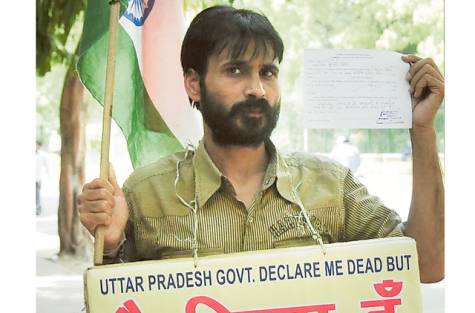
New Delhi, July 14: It may sound bizarre, but reflects a sorry state of affairs that can happen only in India! Some “living” people want justice, as they have been declared “dead” on paper — certified by government documents.
Santosh Singh is a “living” example who told Gulf News, “It took minutes for the government department in the state of Uttar Pradesh to issue a fake ‘death certificate’ at the behest of my relatives who usurped my property. But no amount of requests to the-powers-that-be has helped get me back the status of being ‘alive’. Imagine, while I am living, I have to prove that I am alive!”
Resident of Chhitauni in Varanasi, Uttar Pradesh, Singh says, “I left my hometown and went to Mumbai, Maharashtra, in 2000 after meeting Bollywood actor Nana Patekar, who was shooting for his film Aanch in our village. He had offered me a job as cook.”
Singh’s problems started when he fell in love and married a Maharashtrian girl from a dalit (lower caste) family.
“My parents had passed away and my sisters were by then married. When I went back to my village, I had to face angry relatives, who threatened to teach me a lesson for marrying a dalit girl. They said I had brought shame upon the thakur (upper caste) family we belong to.
“The villagers declared me an outcast and my relatives reported me ‘missing’. Soon after, my cousins, who are politically well connected, prepared fake documents and declared me ‘dead’. They have since grabbed my land and property.”
Singh’s battle in the court to get back his identity and land bore no result, as the date of hearing kept being postponed for many years. “I had no money left to pay the lawyer and he ditched me,” he says dejectedly.
Left with no choice, a few months back, Singh took his fight to Jantar Mantar in Delhi. He sits with a placard that reads, Mein zinda hoon (I am alive). Passers-by look at him quizzically. While some sympathise with him, others are unable to fathom his dilemma.
Remonstrating just a couple of kilometres away from where the high-and-mighty political leaders reside, he laments, “Except assurances, I have received nothing. Even the police sided with my cousins and beat me up mercilessly, due to which my left ear drum is permanently damaged.”
Fed up of the struggle and finding that all channels have till now led to a dead end, Singh sobs bitterly and requests, “Please help me. Kindly publish my mobile number: 00971-8587870812 for any kind of assistance to reach me.
“My wife and five-year-old son are staying with my in-laws in Mumbai and want me to go back to them. But my only wish is to reclaim my ancestral property, which I wish to sell and start life afresh.”
Meanwhile, Singh is not an isolated case of people declared “dead” by greedy relatives to grab land in villages all over the country. The situation has become such that an association has been formed to fight for the rights of the “living dead”.
Called Mritak Sangh (Association of the Dead), it was launched by a farmer Lal Bihari in Uttar Pradesh. He was in the process of applying for a loan when the bank representative told him that his papers had been rejected. Government records showed he was no longer among the living. And there was even a death certificate bearing his name.
Bihari learnt that it was not a case of any administrative blunder, but his unscrupulous relative had bribed an official to provide a false death certificate. During his fight for justice Bihari realised there were several hundred others suffering the same predicament.
The association formed by Bihari has decided to walk the streets of Azamgarh in Uttar Pradesh on July 30, to put pressure on the government to look into their misery.
But Singh claims, “No association, NGO or rights activists have come to anyone’s help till now.”






Comments
Add new comment